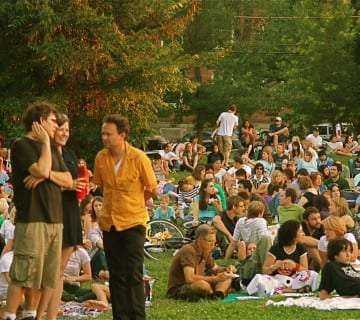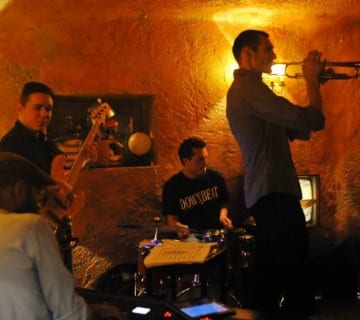
Sriram Gopal
Swing District
“Jazz and Justice” has long been the motto of D.C.’s WPFW-FM. The community radio station, located on the dial at 89.3 FM and part of the Pacifica network, was founded in 1977 with the mission of providing “outlets for the creative skills and energies of the community, to contribute to a lasting understanding between individuals of all nations, races, creeds and colors, and to promote the full distribution of public information.” The station became a vital source of not just alternative political commentary, but also music that was considered unviable on commercial outlets. PFW, as it is known in shorthand, was the only place local audiences could turn to hear a program dedicated to issues facing Native Americans, or a literary program featuring out-of-the-mainstream authors. For much of its existence, PFW has also been the most reliable local outlet for jazz broadcasting, with programming ranging from traditional blues to free jazz. Now, the richness of WPFW’s content is at risk.
“There was no other source for the kinds of things we were doing,” said Bobby Hill, the station’s former program director, referring to the times before and after another local station, the now-defunct WDCU, also featured jazz. “For many years, there was no other choice within the jazz community.”
Hill resigned from WPFW in December after a series of highly controversial changes were implemented. The Washington City Paper published an excellent piece that month giving a history of the station and a play-by-play of what had happened; here’s a very brief summary of the recent events. The roots of WPFW’s problems stretch back to internal politics between Pacifica, WPFW and a prominent former staffer. However, as with most disputes of this sort, it really boils down to matters of dollars and cents.
Current General Manager John Hughes assumed his position at the station in 2011, taking control of an organization with chronic budget deficits and decreasing listenership. WPFW received up to 90 percent of its income from listener donations, and those donations were dropping as the audience aged and the economy tightened. At the end of November 2012, Hughes announced plans for a number of drastic changes, which included canceling many long-running programs, syndicating broadcasts from NPR and Public Radio International, changing its daytime programming to an almost all-talk format, and moving its jazz programs to post-rush hour and late-night slots. His decisions were met with fierce resistance, and Hughes – who did not respond to requests for comment – stepped back on some issues. He has since reinstated some shows that he’d planned to cut, and elected not to syndicate any national broadcasts. But there is no doubt that WPFW’s public face has changed permanently.
“It’s a new look,” Hill said. “It may work, but that remains to be seen. I don’t have a pulse on the community to see how they feel about it.”
Unfortunately, WPFW’s story is being repeated across the country, with community radio stations either folding or completely revamping their business models – which often means cutting down on music such as jazz. At the risk of sounding sentimental, it would be a real loss if jazz lost this key route of exposure. Jazz is already mistakenly viewed as a museum piece, as an art form that is created in an ivory tower. The free and widespread access that radio gives people to the music can help dispel this myth. And when you listen to a station like PFW, mainstream, classic and cutting-edge jazz are played side by side, giving listeners insight into the range of tastes and experiences to which this music can appeal. Now, people who seek art – and opinions – that defy the increasingly segmented popular culture will lose an important source.

The Telecommunications Act of 1996 heavily deregulated radio. Courtesy drewish/flickr
There are a multitude of reasons why this is happening, but the two central explanations lie in a major regulatory change and the advent of new technologies. First, Congress passed the Telecommunications Act of 1996. Just a couple sentences in the massive bill lifted the caps on the number of stations a company could own. Under the deregulation, conglomerates like ClearChannel went from owning dozens of stations to owning thousands.
“Once the dust settled, these radio station group owners realized they had overpaid for the stations and immediately started making cuts and consolidating programming to save money,” said Jean Cook, director of programs for the Future of Music Coalition, an education, research and advocacy group for musicians. “Program directors and news departments were cut across the industry and the commercial dial became more homogenous.”
Then, there is the rise of the internet and on-demand outlets. As Cook noted, a recent Nielsen study showed that radio is still the dominant way that people access new music, and tapping into new listeners is increasingly important to the jazz world. Unfortunately, that same study shows that the writing may be on the wall for both commercial and community radio, because teens listen to music through YouTube more than through any other source. Furthermore, outlets like Spotify and Pandora not only allow a listener access to her favorite artists without charge, but expose her to new music at the click of a button.
These technological changes and the resulting shifts in listener behavior make the choices facing community radio are all the more difficult. The central question for WPFW is whether changing its programming to increase listenership and donations undermines its very mission, which is to serve under-represented communities. I am not concerned about people like myself, white-collar professionals who have access to more gadgets and information than is probably healthy. While I would miss PFW if it went away, there would be no shortage of outlets to help me fill the void. After all, I haven’t subscribed to a print newspaper since 2003 and haven’t bought a CD since 2006, yet I still have no problem getting news and music, both in and out of the mainstream.
What concerns me are the people that don’t have this same level of resources. It would be shameful if communities that are often ignored lost one of the few remaining outlets for their voices to be heard. There are at least two potential avenues of recourse for such folks. Reversing the consolidation of radio stations would be the first step.
“The FCC reviews its media ownership rules every four years. So every four years, there is an opportunity to make the case to the FCC why large station group owners should not get larger,” Cook explained. “It’s through massive public outcry in 2002 that consolidation stopped where it did.”
There is also a grassroots movement of sorts aimed at expanding non-commercial radio. Headed by the Prometheus Radio Project, these organizations are trying to establish a network of micro-radio stations, sometimes referred to as Low Power FM. These stations can be run on limited non-profit budgets and are designed to serve the interests of local communities. This avenue arose because in 2010, Congress passed the Local Community Radio Act, which President Obama signed in January 2011. The Federal Communications Commission has started establishing regulations under this law, and will be issuing thousands of licenses. Community groups may be able to apply for them in the near future.
I can’t say that I’m very optimistic for the future of stations like WPFW, but I take hope in knowing that if the current community radio infrastructure collapses, there at least exists a possibility for a new system to take its place. Whether communities will be able to organize around this possibility remains an open question. ![]()
—
Sriram Gopal is CapitalBop’s monthly columnist. He can be reached at [email protected].




The writer misses the point of public and community radio, which is not to serve individual needs or promote individual knowledge, but to serve and preserve communities and to foster common and public knowledge.
The availability of individuals to utilize new technologies to gain knowledge for themselves as separate persons does nothing to inform and serve communities.
While community radio will be sorely missed, it’s message can hopefully live on through other technologies. The great thing about radio is that accessing it is free while the internet takes far more resources to access. So, if free wifi could be setup in communities (there are serious proposals to make this happen at the national level), internet radio could be easily accessible as normal radio is today. Internet radio would be more affordable for small radio stations and would circumvent the radio behemoths.
There are a number of factors involved in WPFW’s issues and I doubt anyone has a full perspective on them (including perhaps some who are grappling with them). Demographics yes. “Market” factors (such as the regulatory framework and changes in technology and the music business) certainly. The economy absolutely. On the other hand perhaps giving an appearance of or in some ways running it as a “club” (despite considerable diversity in programming) only works if the members who feel part of that club/audience/community will (and are able to!) support it (or if others who can support an effort to serve those who can’t financially support it).
How the attempted changes were implemented made for a very messy situation, though it seems messy situations are periodic there. Some of those changes removed shows that were on the cutting edge of that diversity or were just tremendous examples of community outreach/involvement or of the richness and knowledge of the programmers (many of whom are truly some of the best anywhere). So the changes did not make sense and were not implemented in a way that was at all transparent (or even comprehensible) to the audience. A primary rule of this sort of makeover would seem to be to do no harm.
It would be a tragedy if WPFW does not survive, since it is a unique resource in the nation (as well as the immediate community).
While beyond the scope of this piece it is quite clear that economic power (and the regulatory power that accrues to those corporations that have it) has been wielded to crush any independent voices in culture, the arts, media, social services, academia, etc. The manipulation of markets (through regulation and/or “deregulation”) and the damage from the economic “crisis” has targeted the remaining bastions of independent thought, while leaving the most powerful/wealthiest even more wealthy, and our collective culture ever poorer.
I am troubled by the author’s statement: “I haven’t subscribed to a print newspaper since 2003 and haven’t bought a CD since 2006, yet I still have no problem getting news and music, both in and out of the mainstream.” Nothing personal to the author in what follows since I don’t know him and won’t judge. Perhaps an Emily White moment, but anyone who even tangentially follows music done by independent musicians (as almost all jazz has to be these days) has an obligation to support those artists (at least if they expect to hear them do anything in the future) and to support them in more than just words that as are as likely as anything else to get lost in that sea of easily obtainable free news and music. I’m often bothered that some close to the music (and with enough understanding of the business to know better) are often entirely cavalier about putting some money where their mouth is. If anyone notices or hears or sees an artist and likes what they did, buy a CD or (pay to) go to their shows. As too many unfortunate events have already shown, if you don’t support what’s happening (with cold, hard cash) you’ll lose the opportunity to experience it in the future. No amount of internet listens are going to buy any jazz artist even a lunch. The content glut is another way the economic powers (in that industry Google and advertising agencies and internet hosts and providers) are using to usurp what is due the artists and to homogenize and control content (and ultimately the audiences).
It’s all “one-to-one marketing” now, but the survival of the arts depends on 1) those close to the arts putting money behind them; and 2) the powers that be not sucking up every last remaining bit of disposable income from all those who aren’t the powers that be.
It’s not just here. WKCR in NYC has been having an emergency fund raising drive all week. It’d be a real loss if that station went away or was radically reformatted.
How depressing the moderator decides to ax a comment that was completely inspired by this column but mentioned another radio station in a different city. It’s a crappy time for radio stations like WPFW and . Folks need to support all good forums for good music and interesting commentary (and yes that means buying a CD on a occasion or otherwise spending some money). Ax away Mr Moderator then go buy your $4 coffee instead of a CD.
[…] The people need community radio stations like WPFW, writes Sriram Gopal [Capital Bop] […]
[…] The people need community radio stations like WPFW, writes Sriram Gopal [Capital Bop] […]
Hal – No comment was axed. There sometimes is a delay in the posting of comments.
Let me get this picture. PFW has maybe the nation’s greatest number
of radio programmers who are both knowledgeable and passionate about
so-called jazz music in the country. Yet the man who calls the shots
appears neither passionate nor knowledgeable. In addition the
programmers are volunteers while the shot caller has a big “baller”
salary to destroy jazz programming. Did the Pacifica Network give up on
PFW? My source tells me that all the Pacifica Network stations are
operating in the red but Houston’s KPFT. Houston may have made some
strides over the years but does Houston have a more “progressive”
listener base, as in open to various forms of artistic expression ,
than San Fran, New York/New York, L.A., or Wash. D.C.?
Some of the things you refer to in your article may be relevant as
to shifting delivery systems, what young people want/ but teenagers
are not generally Pacifica Network’s target audience and a lot can happen
in a decade when they get close to the target age. I believe there are
some age old power struggles going on. It might be enough
blame to go around when talking about office politics. That might be a
politcally cute way of saying things. But in this age of corporate
executives getting paid while their organizations collapse, or getting
down to the Nitty Gritty, as Horace Silver would say, who is getting
paid to do what and why(motive)? Is a good consistent gauge
of an organization’s economic and indeed overall health.
Washington DC seems like a town on the brink of being ‘a music town’. If it could get the kind of recognition of an Austin, Nashville, New York, it will be good news for the whole community. So, what a pity if its only musician-accessible public voice, WPFW, disappears.
Thankful though I am for the music programming which remains, the last thing I need is another talk radio channel on the dial, which is what WPFW has become during the weekday hours.
In addition to the big ‘national venues’ like the Kennedy Center and Strathmore, there has been recent explosion of venues large and small, movies about DC’s music history, great music of all genres…and a younger and economically buoyant population going out to participate.
Sure, WPFW probably needs to adapt to some of these changes but not by going to talk format. Even more important, the ‘industry’ – musicians, and venues – which benefit from WPFW publicity need to pitch in financially. As musicians, WPFW has been good to us and we pay back what we can at the pledge drives in money and in kind with free CD’s etc. If it disappears I think a lot of musicians and venues will miss it, for sure in their pockets and in their speakers.
I don’t see what a conglomerate has to do with WPFW’s problem. Even with the arrival of new technology PFW has adapted by streaming live over the internet and providing program archives. What’s available on pandora etc., are closer to the circus on commercial radio, which doesn’t offer any serious programming that could add value to one’s life.
I see the drop in listenership coming from a lack of public awareness about the station. The majority of people respond ‘no’, when I ask whether they’ve heard of the station. There are a few generations of listeners as well as domestic and international immigrants who’ve settled in the area who are likely to support the local and national public affairs shows if the station did consistent advertising and outreach. Very few young listeners are mature enough to listen and probably can’t afford to support, so noone should be surprised that the older audience is the core listenership. However, I predict that as social and economic hardships increase, young people will be looking for answers. That’s when they’ll turn to WPFW and community radio for the truth. Peace, if you’re willing to fight for it!
[…] one local organization’s downfall become the stuff of a fundraiser to keep another alive. WPFW has felt the crush of hardship that has hit much of the media economy – but especially community r…. And Bohemian was battered by similar headwinds: a consumer climate that is increasingly hostile to […]